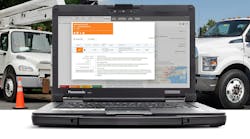Getting rid of the endless streams of paper in trucking isn't just limited to the applications and forms demanded on the recruiting side of things. It's a much broader effort to push everything from bills of lading to invoices and receipts into the electronic medium.
“It's all about reducing the manpower required to process standard paperwork,” says James Zubok, CFO of Ashburn, VA-based Brainware. His company provides what's called “intelligent data capture” via its Distiller software. The product helps companies eliminate costly manual data entry, rapidly process large volumes of documents, and retrieve data from across their business — all saving time and money for fleets.
“One large fleet, for example, needed a staff of 150 just to manually key in data from bills of lading,” he says. “By switching to our system, only 20 people were needed, largely to correct errors or verify information obscured by smudges, reducing their processing costs by 60 to 80%, a savings of $4 million per year. Also, it allowed the company to move 130 people from the tedious job of data entry to more productive tasks.”
San Diego-based Qualcomm is beefing up its efforts to help drivers go paperless with a new in-cab scanning service — a new addition to the OmniVision Transportation offering — to enable drivers to scan and transmit important documents such as trip and mileage reports, bills of lading, timesheets, receipts and other critical information.
“These activities can be performed immediately and from the cab of the truck, improving driver productivity by eliminating the need to search for truck stops with scanners,” says Norm Ellis, says Qualcomm's vp-transportation and logistics sales and service.
“In-cab scanning also helps increase the pace of the business cycle for carriers. Data is received in minutes, rather than hours, which can speed up billing and other business processes for faster payment and improved operational performance,” he explains. “The time-consuming process of making extra stops to copy, scan, fax or mail documents is eliminated, which helps to improve productivity, profitability and drivers' quality of life.”


